Unit 2 I think that mooncakes are delicious! 课件(共29张PPT) 2024-2025学年英语人教版九年级全一册
文档属性
| 名称 | Unit 2 I think that mooncakes are delicious! 课件(共29张PPT) 2024-2025学年英语人教版九年级全一册 | 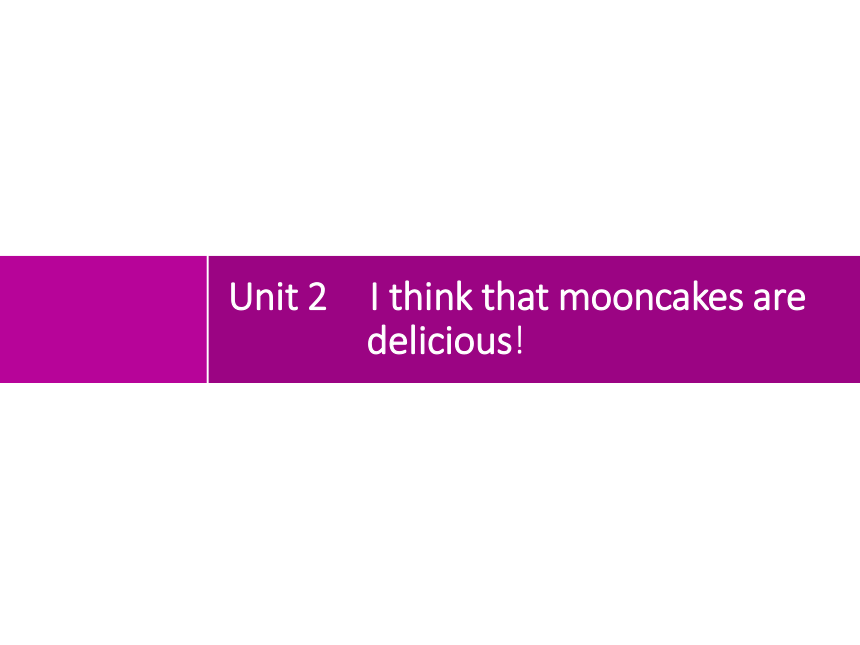 | |
| 格式 | pptx | ||
| 文件大小 | 182.3KB | ||
| 资源类型 | 教案 | ||
| 版本资源 | 人教新目标(Go for it)版 | ||
| 科目 | 英语 | ||
| 更新时间 | 2024-06-07 20:14:33 | ||
图片预览

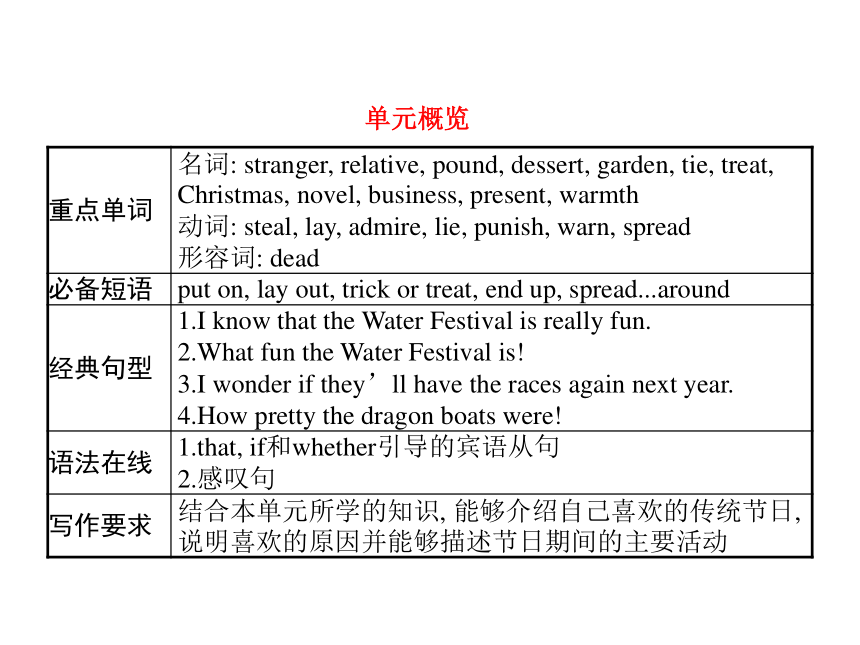
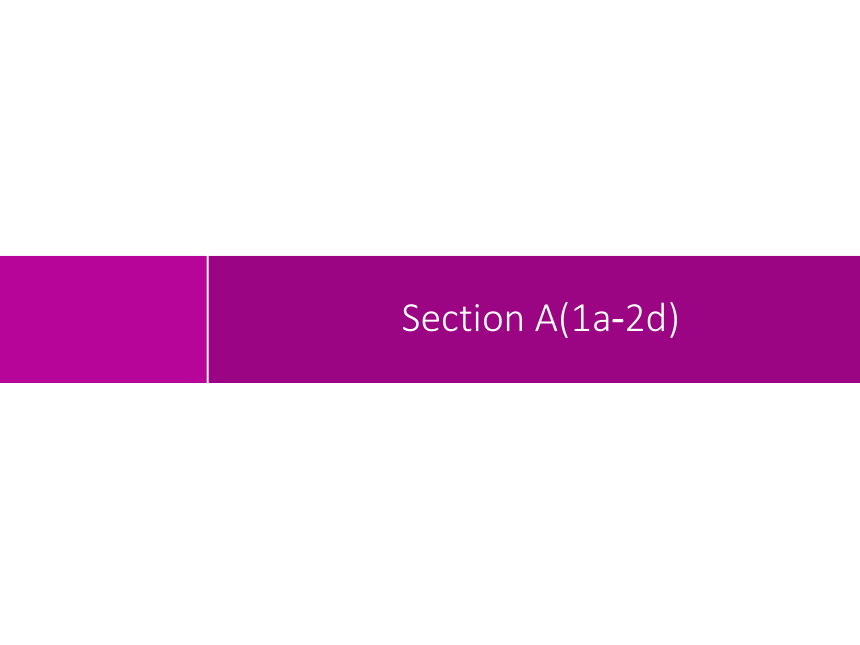
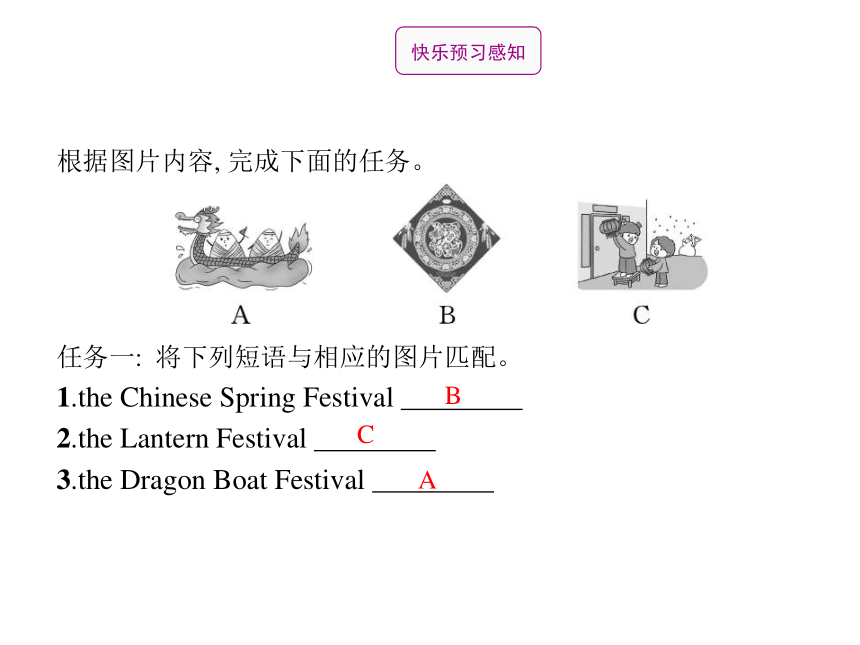
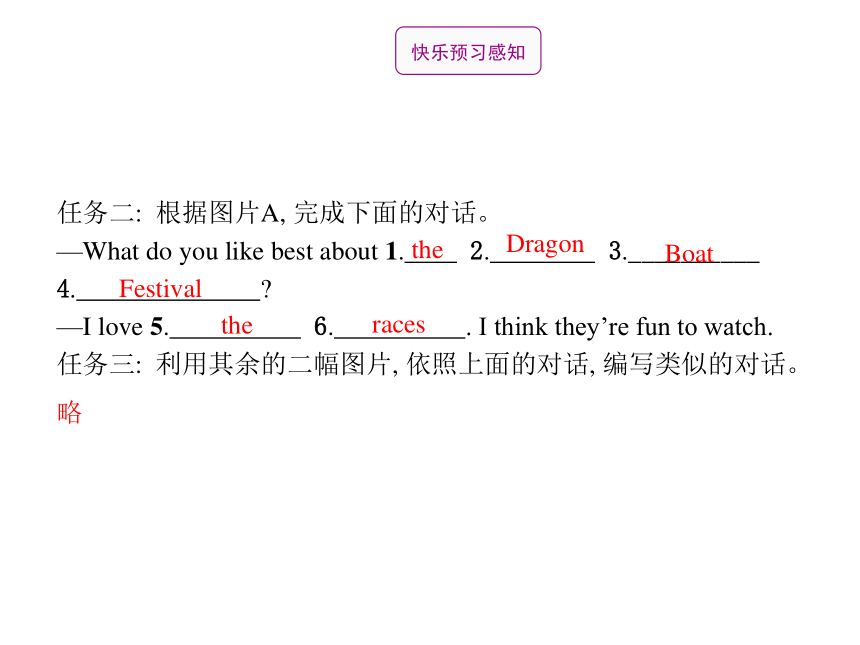
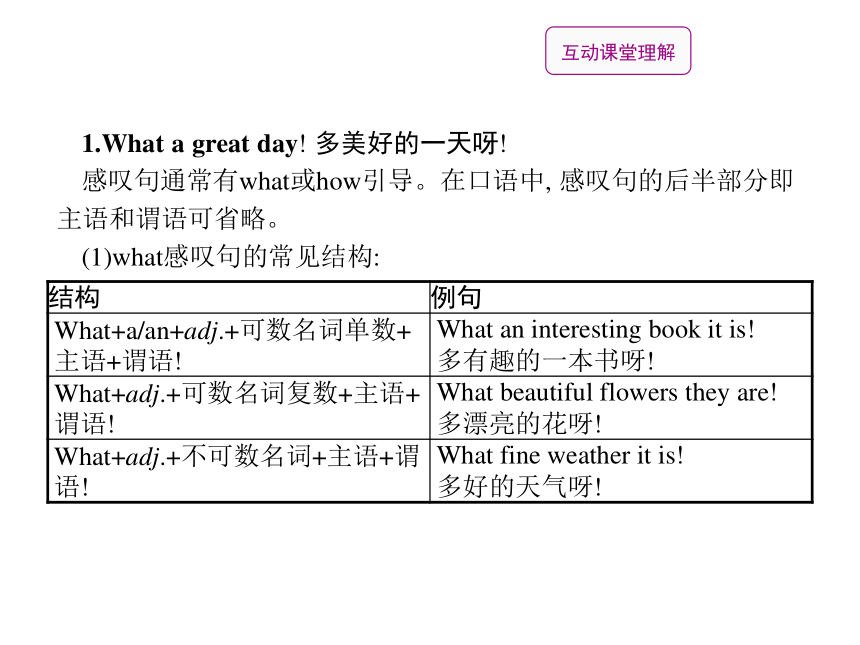
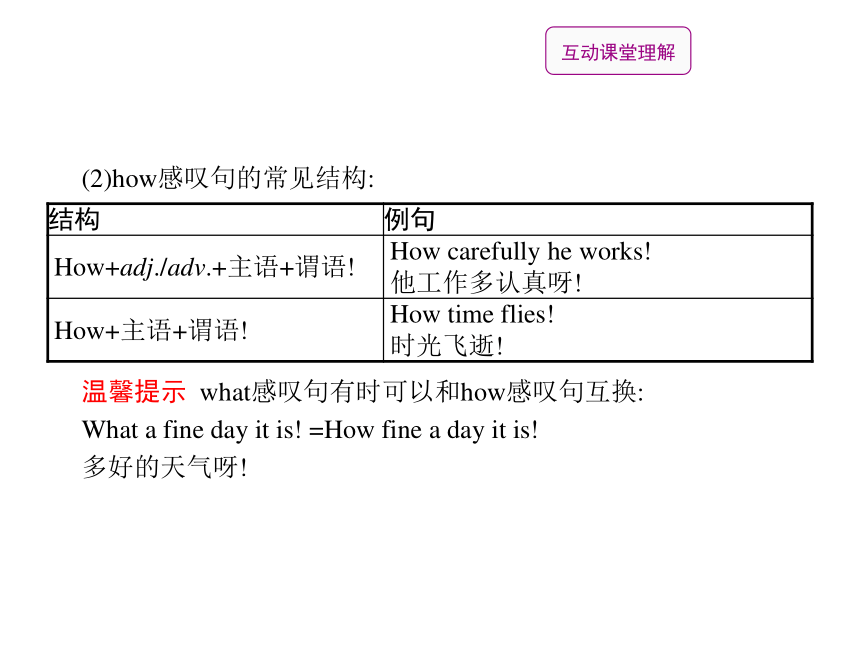
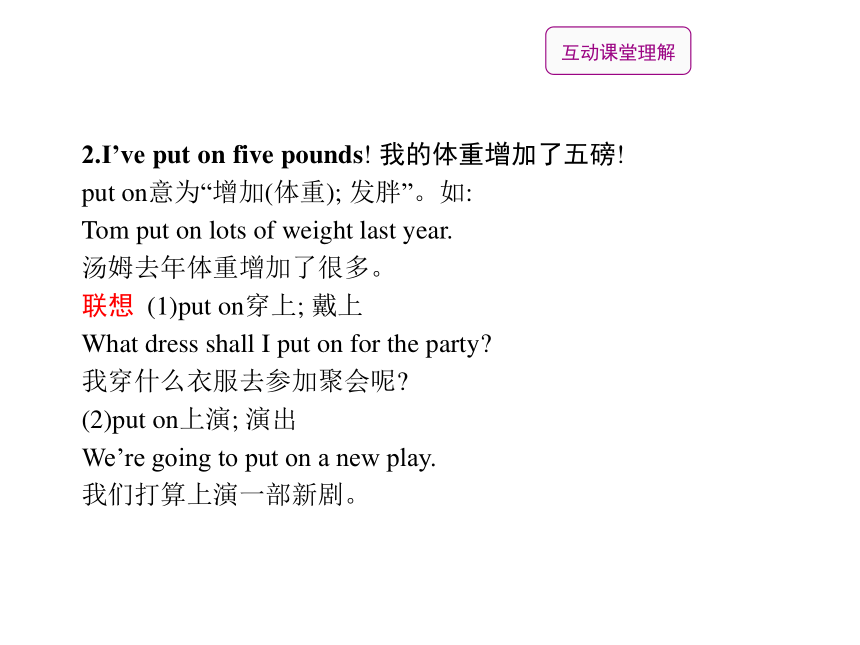
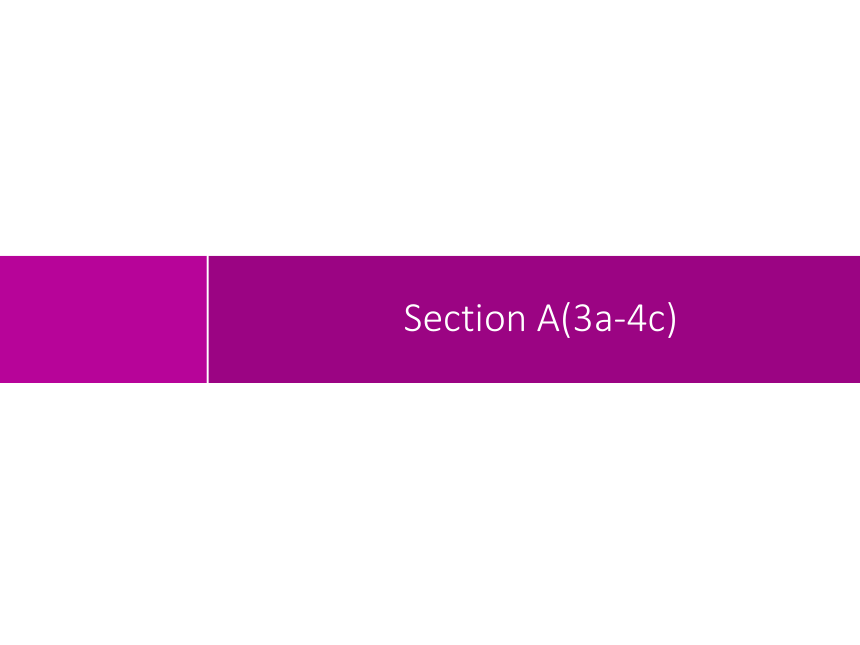
文档简介
(共29张PPT)
Unit 2 I think that mooncakes are
delicious!
单元概览
重点单词 名词: stranger, relative, pound, dessert, garden, tie, treat, Christmas, novel, business, present, warmth
动词: steal, lay, admire, lie, punish, warn, spread
形容词: dead
必备短语 put on, lay out, trick or treat, end up, spread...around
经典句型 1.I know that the Water Festival is really fun.
2.What fun the Water Festival is!
3.I wonder if they’ll have the races again next year.
4.How pretty the dragon boats were!
语法在线 1.that, if和whether引导的宾语从句
2.感叹句
写作要求 结合本单元所学的知识, 能够介绍自己喜欢的传统节日, 说明喜欢的原因并能够描述节日期间的主要活动
Section A(1a-2d)
根据图片内容, 完成下面的任务。
任务一: 将下列短语与相应的图片匹配。
1.the Chinese Spring Festival
2.the Lantern Festival
3.the Dragon Boat Festival
B
C
A
任务二: 根据图片A, 完成下面的对话。
—What do you like best about 1. 2. 3.__________ 4.
—I love 5. 6. . I think they’re fun to watch.
任务三: 利用其余的二幅图片, 依照上面的对话, 编写类似的对话。
the
Dragon
Boat
Festival
the
races
略
1.What a great day! 多美好的一天呀!
感叹句通常有what或how引导。在口语中, 感叹句的后半部分即主语和谓语可省略。
(1)what感叹句的常见结构:
结构 例句
What+a/an+adj.+可数名词单数+主语+谓语! What an interesting book it is!
多有趣的一本书呀!
What+adj.+可数名词复数+主语+谓语! What beautiful flowers they are!
多漂亮的花呀!
What+adj.+不可数名词+主语+谓语! What fine weather it is!
多好的天气呀!
温馨提示 what感叹句有时可以和how感叹句互换:
What a fine day it is! =How fine a day it is!
多好的天气呀!
结构 例句
How+adj./adv.+主语+谓语! How carefully he works!
他工作多认真呀!
How+主语+谓语! How time flies!
时光飞逝!
(2)how感叹句的常见结构:
2.I’ve put on five pounds! 我的体重增加了五磅!
put on意为“增加(体重); 发胖”。如:
Tom put on lots of weight last year.
汤姆去年体重增加了很多。
联想 (1)put on穿上; 戴上
What dress shall I put on for the party
我穿什么衣服去参加聚会呢
(2)put on上演; 演出
We’re going to put on a new play.
我们打算上演一部新剧。
Section A(3a-4c)
预习Section A 3a, 完成下面的任务。
任务一: 小组讨论以下两个问题, 并给出适当答案。
1.What story is the reading about
_____________________________________________________
2.How do people celebrate the Mid-Autumn Festival
_____________________________________________________
任务二: 你还了解哪些民间传说 请搜集整理并与大家分享。
略
略
He quickly laid out her favorite fruits and desserts in the garden.
他很快把她最喜欢的水果和甜食摆在了园子里。
(1)lay 是动词, 意为“放置; 安放; 产(卵); 下(蛋)”, 其过去式和过去分词都是laid, 现在分词是laying。如:
You may lay it on the table.
你可以把它放在桌上。
The hen laid an egg just now.
这只母鸡刚才下了一只蛋。
拓展 ①lay还是动词lie(存在; 躺; 位于)的过去式。
②lie(躺), lie(说谎)与lay(放置; 产卵; 下蛋)的拼写、词义与动词过去式、过去分词的变化很容易混淆, 可用下面的口诀助记:
巧记lie和lay
躺 lie, lay, lain, lie in bed again;
撒谎 lie, lied, lied, don’t be a liar;
产蛋 lay, laid, laid, a hen laid an egg;
放置 A boy picked it up, and laid it in the bag.
温馨提示 lie还可用作名词, 意为“谎言”。
一言辨异 He often tells lies. He lied to you just now.
他经常撒谎。刚才他向你撒谎了。
(2)lay out意为“摆开; 布置”。如:
Can you help me lay out the books on the shelf
你可以帮我把这些书摆放在书架上吗
Section B(1a-1d)
小组活动: 按要求完成下面的任务。
任务一: 讨论并整理有关万圣节的知识, 然后完成下面的表格。
任务二: 你还了解哪些中国的传统节日呢 你最喜欢哪个节日 小组讨论并分享讨论结果。
略
略
trick or treat 不招待就捣乱
(1)treat是名词, 意为“款待; 招待”。如:
It’s a great treat for me to have a swim in such hot weather.
对我来说在这样炎热的天气里游泳真是太享受了。
拓展 treat还可用作动词, 意为“招待; 请(客)”。如:
Mr.Wang treated us to dinner.
王先生请我们吃的晚饭。
(2)trick or treat是指万圣节孩子们挨家逐户索要糖果等礼物, 如不遂愿便恶作剧一番的风俗。如:
They often play a game of “trick or treat” on Halloween.
他们经常在万圣节玩“不招待就捣乱”的游戏。
Section B(2a-3b)
任务: 预习Section B 2b, 从中找出下面的短语。
1.……的精神
2.……的真正意义
3.生意伙伴
4.警告某人做某事
5.最终成为
6.使某人想起……
7.醒来
8.承诺做某事
9.和某人一起庆祝……
10.传播爱与快乐
the spirit of
the true meaning of
business partner
warn sb. to do sth.
end up
remind sb. of ...
wake up
promise to do sth.
celebrate ...with sb.
spread love and joy
He warns Scrooge to change his ways if he doesn’t want to end up like him.
他告诫斯克鲁奇如果不想最终成为像他那样的下场的话, 就必须改变生活方式。
(1)warn是动词, 意为“警告;告诫”, 主要用法如下:
①warn sb.(not) to do sth.意为“警告某人(不要)干某事”。如:
The teachers often warn us to keep away from the net bar. 老师经常告诫我们要远离网吧。
②warn sb.of/about sth.意为“提醒/警告某人注意某事”。如:
He warned me of the dog.
他提醒我当心那条狗。
③warn sb.against (doing) sth.意为“警告某人当心/提防某事”。如:
She warned me against the pickpocket.
她警告我要提防扒手。
④warn+that从句。如:
I warn you that you’ll fail in the exam if you don’t work harder.
我警告你, 如果你不更加努力的话, 就会考试不及格。
(2)end up意为“最终成为; 最后处于”。如:
Somebody like him could end up as a goat.
像他这样的人最后可能变成替罪羊。
Self Check
任务一: 把下列句子合并成含宾语从句的复合句。
1.Bill works harder than before. I think...
________________________________________________________
2.Miss Feng will go back to her hometown for the Spring Festival. We wonder...
______________________________________________________________________________________
3.We will come to watch the races next year. We believe...
________________________________________________________
I think that Bill works harder than before.
We wonder if/whether Miss Feng will go back to her hometown for the Spring Festival.
We believe that we will come to watch the races next year.
任务二: 把下列陈述句改为感叹句。
1.Jill is drawing a beautiful picture.
_______________________________________________________
2.The cat is very happy.
_________________________________________________
3.The bike is going very slowly.
_________________________________________
4.They’re having delicious food!
_______________________________________
What a beautiful picture Jill is drawing!
How happy the cat is!
How slowly the bike is going!
What delicious food they’re having!
1.Not only do people spread them around in different hiding places for an egg hunt, but they also give out these treats as gifts.
人们不仅会把鸡蛋分散地藏在不同的地方来玩寻蛋游戏, 而且还把它们作为礼物分发出去。
not only...but also连接并列的句子时, not only 后的句子要用部分倒装语序, 但but also后的分句不用倒装语序。如:
Not only does he know French, but he is also expert at it. 他不但懂法语, 而且很精通。
温馨提示 如果置于句首的not only...but also连接两个并列主语, 则句子不用倒装结构。如:
Not only Rose but also Sally likes singing.
不但罗斯喜欢唱歌, 而且萨莉也喜欢唱歌。
2.spread...around传播; 散播
spread...around意为“传播; 散播”。如:
It is known that ball games have spread around the world.
众所周知, 球类运动已经在世界各地传播开了。
Don’t spread the news around.
别到处传播这个消息。
语 法 专 练
一、单项选择
1.— it is today!
—Yes. Shall we go hiking
A.How fine weather
B.What fine weather
C.What a fine weather
D.How fine the weather
2. amazing game it was!
A.What an
B.How an
C.What
D.How
B
A
3.He says he’s got a new bike, but I don’t know that’s for real.
A.if B.that
C.what D.why
4.I’m not sure I’ve met him before.
A.whether B.when
C.how D.why
5.This time I don’t know if I the exam. If I the exam, I’ll have a great vacation.
A.pass; pass
B.pass; will pass
C.will pass; pass
D.will pass; will pass
A
A
C
二、按要求完成下列句子
1.My friend said to me,“You speak English well.”(改为同义句)
My friend told me English well.
2.Coco is an amazing movie. (改为感叹句)
amazing movie Coco is!
3.I think it important to learn English well. (改为复合句)
I think important to learn English well.
4.She asked me,“Do you know the way to the post office ”(改为同义句)
She asked me the way to the post office.
5.I was very surprised to meet him there. (改为感叹句)
I was to meet him there!
that I spoke
What
an
that it is
if/whether I knew
How
surprised
Unit 2 I think that mooncakes are
delicious!
单元概览
重点单词 名词: stranger, relative, pound, dessert, garden, tie, treat, Christmas, novel, business, present, warmth
动词: steal, lay, admire, lie, punish, warn, spread
形容词: dead
必备短语 put on, lay out, trick or treat, end up, spread...around
经典句型 1.I know that the Water Festival is really fun.
2.What fun the Water Festival is!
3.I wonder if they’ll have the races again next year.
4.How pretty the dragon boats were!
语法在线 1.that, if和whether引导的宾语从句
2.感叹句
写作要求 结合本单元所学的知识, 能够介绍自己喜欢的传统节日, 说明喜欢的原因并能够描述节日期间的主要活动
Section A(1a-2d)
根据图片内容, 完成下面的任务。
任务一: 将下列短语与相应的图片匹配。
1.the Chinese Spring Festival
2.the Lantern Festival
3.the Dragon Boat Festival
B
C
A
任务二: 根据图片A, 完成下面的对话。
—What do you like best about 1. 2. 3.__________ 4.
—I love 5. 6. . I think they’re fun to watch.
任务三: 利用其余的二幅图片, 依照上面的对话, 编写类似的对话。
the
Dragon
Boat
Festival
the
races
略
1.What a great day! 多美好的一天呀!
感叹句通常有what或how引导。在口语中, 感叹句的后半部分即主语和谓语可省略。
(1)what感叹句的常见结构:
结构 例句
What+a/an+adj.+可数名词单数+主语+谓语! What an interesting book it is!
多有趣的一本书呀!
What+adj.+可数名词复数+主语+谓语! What beautiful flowers they are!
多漂亮的花呀!
What+adj.+不可数名词+主语+谓语! What fine weather it is!
多好的天气呀!
温馨提示 what感叹句有时可以和how感叹句互换:
What a fine day it is! =How fine a day it is!
多好的天气呀!
结构 例句
How+adj./adv.+主语+谓语! How carefully he works!
他工作多认真呀!
How+主语+谓语! How time flies!
时光飞逝!
(2)how感叹句的常见结构:
2.I’ve put on five pounds! 我的体重增加了五磅!
put on意为“增加(体重); 发胖”。如:
Tom put on lots of weight last year.
汤姆去年体重增加了很多。
联想 (1)put on穿上; 戴上
What dress shall I put on for the party
我穿什么衣服去参加聚会呢
(2)put on上演; 演出
We’re going to put on a new play.
我们打算上演一部新剧。
Section A(3a-4c)
预习Section A 3a, 完成下面的任务。
任务一: 小组讨论以下两个问题, 并给出适当答案。
1.What story is the reading about
_____________________________________________________
2.How do people celebrate the Mid-Autumn Festival
_____________________________________________________
任务二: 你还了解哪些民间传说 请搜集整理并与大家分享。
略
略
He quickly laid out her favorite fruits and desserts in the garden.
他很快把她最喜欢的水果和甜食摆在了园子里。
(1)lay 是动词, 意为“放置; 安放; 产(卵); 下(蛋)”, 其过去式和过去分词都是laid, 现在分词是laying。如:
You may lay it on the table.
你可以把它放在桌上。
The hen laid an egg just now.
这只母鸡刚才下了一只蛋。
拓展 ①lay还是动词lie(存在; 躺; 位于)的过去式。
②lie(躺), lie(说谎)与lay(放置; 产卵; 下蛋)的拼写、词义与动词过去式、过去分词的变化很容易混淆, 可用下面的口诀助记:
巧记lie和lay
躺 lie, lay, lain, lie in bed again;
撒谎 lie, lied, lied, don’t be a liar;
产蛋 lay, laid, laid, a hen laid an egg;
放置 A boy picked it up, and laid it in the bag.
温馨提示 lie还可用作名词, 意为“谎言”。
一言辨异 He often tells lies. He lied to you just now.
他经常撒谎。刚才他向你撒谎了。
(2)lay out意为“摆开; 布置”。如:
Can you help me lay out the books on the shelf
你可以帮我把这些书摆放在书架上吗
Section B(1a-1d)
小组活动: 按要求完成下面的任务。
任务一: 讨论并整理有关万圣节的知识, 然后完成下面的表格。
任务二: 你还了解哪些中国的传统节日呢 你最喜欢哪个节日 小组讨论并分享讨论结果。
略
略
trick or treat 不招待就捣乱
(1)treat是名词, 意为“款待; 招待”。如:
It’s a great treat for me to have a swim in such hot weather.
对我来说在这样炎热的天气里游泳真是太享受了。
拓展 treat还可用作动词, 意为“招待; 请(客)”。如:
Mr.Wang treated us to dinner.
王先生请我们吃的晚饭。
(2)trick or treat是指万圣节孩子们挨家逐户索要糖果等礼物, 如不遂愿便恶作剧一番的风俗。如:
They often play a game of “trick or treat” on Halloween.
他们经常在万圣节玩“不招待就捣乱”的游戏。
Section B(2a-3b)
任务: 预习Section B 2b, 从中找出下面的短语。
1.……的精神
2.……的真正意义
3.生意伙伴
4.警告某人做某事
5.最终成为
6.使某人想起……
7.醒来
8.承诺做某事
9.和某人一起庆祝……
10.传播爱与快乐
the spirit of
the true meaning of
business partner
warn sb. to do sth.
end up
remind sb. of ...
wake up
promise to do sth.
celebrate ...with sb.
spread love and joy
He warns Scrooge to change his ways if he doesn’t want to end up like him.
他告诫斯克鲁奇如果不想最终成为像他那样的下场的话, 就必须改变生活方式。
(1)warn是动词, 意为“警告;告诫”, 主要用法如下:
①warn sb.(not) to do sth.意为“警告某人(不要)干某事”。如:
The teachers often warn us to keep away from the net bar. 老师经常告诫我们要远离网吧。
②warn sb.of/about sth.意为“提醒/警告某人注意某事”。如:
He warned me of the dog.
他提醒我当心那条狗。
③warn sb.against (doing) sth.意为“警告某人当心/提防某事”。如:
She warned me against the pickpocket.
她警告我要提防扒手。
④warn+that从句。如:
I warn you that you’ll fail in the exam if you don’t work harder.
我警告你, 如果你不更加努力的话, 就会考试不及格。
(2)end up意为“最终成为; 最后处于”。如:
Somebody like him could end up as a goat.
像他这样的人最后可能变成替罪羊。
Self Check
任务一: 把下列句子合并成含宾语从句的复合句。
1.Bill works harder than before. I think...
________________________________________________________
2.Miss Feng will go back to her hometown for the Spring Festival. We wonder...
______________________________________________________________________________________
3.We will come to watch the races next year. We believe...
________________________________________________________
I think that Bill works harder than before.
We wonder if/whether Miss Feng will go back to her hometown for the Spring Festival.
We believe that we will come to watch the races next year.
任务二: 把下列陈述句改为感叹句。
1.Jill is drawing a beautiful picture.
_______________________________________________________
2.The cat is very happy.
_________________________________________________
3.The bike is going very slowly.
_________________________________________
4.They’re having delicious food!
_______________________________________
What a beautiful picture Jill is drawing!
How happy the cat is!
How slowly the bike is going!
What delicious food they’re having!
1.Not only do people spread them around in different hiding places for an egg hunt, but they also give out these treats as gifts.
人们不仅会把鸡蛋分散地藏在不同的地方来玩寻蛋游戏, 而且还把它们作为礼物分发出去。
not only...but also连接并列的句子时, not only 后的句子要用部分倒装语序, 但but also后的分句不用倒装语序。如:
Not only does he know French, but he is also expert at it. 他不但懂法语, 而且很精通。
温馨提示 如果置于句首的not only...but also连接两个并列主语, 则句子不用倒装结构。如:
Not only Rose but also Sally likes singing.
不但罗斯喜欢唱歌, 而且萨莉也喜欢唱歌。
2.spread...around传播; 散播
spread...around意为“传播; 散播”。如:
It is known that ball games have spread around the world.
众所周知, 球类运动已经在世界各地传播开了。
Don’t spread the news around.
别到处传播这个消息。
语 法 专 练
一、单项选择
1.— it is today!
—Yes. Shall we go hiking
A.How fine weather
B.What fine weather
C.What a fine weather
D.How fine the weather
2. amazing game it was!
A.What an
B.How an
C.What
D.How
B
A
3.He says he’s got a new bike, but I don’t know that’s for real.
A.if B.that
C.what D.why
4.I’m not sure I’ve met him before.
A.whether B.when
C.how D.why
5.This time I don’t know if I the exam. If I the exam, I’ll have a great vacation.
A.pass; pass
B.pass; will pass
C.will pass; pass
D.will pass; will pass
A
A
C
二、按要求完成下列句子
1.My friend said to me,“You speak English well.”(改为同义句)
My friend told me English well.
2.Coco is an amazing movie. (改为感叹句)
amazing movie Coco is!
3.I think it important to learn English well. (改为复合句)
I think important to learn English well.
4.She asked me,“Do you know the way to the post office ”(改为同义句)
She asked me the way to the post office.
5.I was very surprised to meet him there. (改为感叹句)
I was to meet him there!
that I spoke
What
an
that it is
if/whether I knew
How
surprised
同课章节目录
- Unit 1 How can we become good learners.
- Section A
- Section B
- Unit 2 I think that mooncakes are delicious!
- Section A
- Section B
- Unit 3 Could you please tell me where the restroom
- Section A
- Section B
- Unit 4 I used to be afraid of the dark.
- Section A
- Section B
- Unit 5 What are the shirts made of?
- Section A
- Section B
- Review of Units 1-5
- Unit 6 When was it invented?
- Section A
- Section B
- Unit 7 Teenagers should be allowed to choose their
- Section A
- Section B
- Unit 8 It must belong to Carla.
- Section A
- Section B
- Unit 9 I like music that I can dance to.
- Section A
- Section B
- Unit 10 You're supposed to shake hands.
- Section A
- Section B
- Review of Units 6-10
- Unit 11 Sad movies make me cry.
- Section A
- Section B
- Unit 12 Life is full of the unexpected
- Section A
- Section B
- Unit 13 We're trying to save the earth!
- Section A
- Section B
- Unit 14 I remember meeting all of you in Grade 7.
- Section A
- Section B
- Review of Units 11-14
